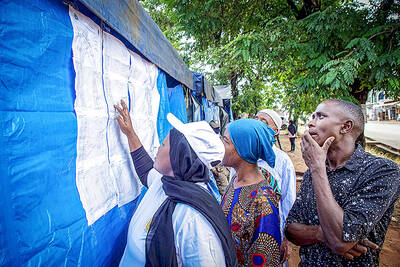Orphans and babies as young as three months old have been used as guinea pigs in potentially dangerous medical experiments sponsored by a giant pharmaceutical company.
British giant GlaxoSmithKline is embroiled in the scandal.
The firm sponsored experiments on the children from Incarnation Children's Center, a New York care home that specializes in treating HIV sufferers and is run by Catholic charities.
The children had either been infected with HIV or born to HIV-positive mothers.
Their parents were dead, untraceable or deemed unfit to look after them.
According to documents, Glaxo has sponsored at least four medical trials since 1995 using Hispanic and black children at Incarnation.
The documents give details of all clinical trials in the US and reveal that the experiments sponsored by Glaxo were designed to test the "safety and tolerance" of AIDS medications, some of which have potentially dangerous side effects.
Glaxo manufactures a number of drugs designed to treat HIV, including AZT.
Normally, trials on children would require parental consent but, as the infants are in care, New York's authorities hold that role.
The city health department has launched an investigation into claims that more than 100 children at Incarnation were used in 36 experiments -- at least four of them co-sponsored by Glaxo.
Some of these trials were designed to test the "toxicity" of AIDS medications.
One involved giving children as young as 4 years old a high-dosage cocktail of seven drugs at one time.
Another looked at the reaction in six-month-old babies to a double dose of measles vaccine.
Most experiments were funded by federal agencies like the National Institute of Allergy and Infectious Diseases.
Until now Glaxo's role had not emerged.
In 1997 an experiment co-sponsored by Glaxo used children from Incarnation to "obtain tolerance, safety and pharmacokinetic" data for herpes drugs.
In a more recent experiment, the children were used to test the drug AZT.
A third experiment sponsored by Glaxo and US drug firm Pfizer investigated the "long-term safety" of anti-bacterial drugs on three-month-old babies.
The medical establishment has defended the trials, arguing they enabled these children to obtain state-of-the-art therapy that they would otherwise not have received for illnesses that could potentially be fatal.
However, health campaigners argue there is a difference between providing the latest drugs and experimentation.
They claim many of the experiments were "phase 1 trials" -- among the most risky.
They also claim that HIV tests for babies are not a reliable indicator of actual infection and therefore toxic drugs could have been given to healthy infants. HIV drugs are similar to those used in chemotherapy and can have serious side effects.
Vera Sharav, president of the Alliance for Human Research Protection, said the children had been treated like "laboratory animals."
"These are some of the most vulnerable individuals in the country and there appears to be a policy of giving drug firms access to them," she said.
"Throughout the history of medical research we have seen prisoners abused, the mentally ill abused and now poor kids in a care home," she said.
Sharav has urged the US Food and Drug Administration to investigate and has demanded complete disclosure of all adverse effects suffered by the children, including deaths.
Glaxo has confirmed it provided funds for some of the experiments but denied any improper action.
A spokeswoman said, "These studies were implemented by the US AIDS Clinical Trial Group, a clinical research network paid for by the National Institutes of Health.
"Glaxo's involvement in such studies would have been to provide study drugs or funding but we would have no interactions with the patients.
"Generally speaking, clinical research is carefully regulated in the US and it would be the responsibility of the appropriate authorities to ensure all subjects in a clinical trial provided appropriate, informed consent to conform with all local laws and regulations regarding legal authority in the case of minors."
The Incarnation trials were run by Columbia University Medical Center doctors.
Columbia spokeswoman Annie Bayne said there had been no clinical trials at Incarnation since 2000 and that consent for the children was provided by the Administration for Children's Services, which relies on a panel of doctors and lawyers to determine whether the benefits of a trial for each child outweighs the risks to the child.
"There are many safeguards in the system. HIV is eventually a fatal disease, but drug therapy has lengthened life significantly," Bayne said.
A spokesman for Incarnation said regarding the scandal, "The purpose of the trials was to test the efficacy of HIV medication."
"These trials were based on scientific evidence of their potential value in the treatment of HIV- infected children," the spokesman said.

With much pomp and circumstance, Cairo is today to inaugurate the long-awaited Grand Egyptian Museum (GEM), widely presented as the crowning jewel on authorities’ efforts to overhaul the country’s vital tourism industry. With a panoramic view of the Giza pyramids plateau, the museum houses thousands of artifacts spanning more than 5,000 years of Egyptian antiquity at a whopping cost of more than US$1 billion. More than two decades in the making, the ultra-modern museum anticipates 5 million visitors annually, with never-before-seen relics on display. In the run-up to the grand opening, Egyptian media and official statements have hailed the “historic moment,” describing the

‘CHILD PORNOGRAPHY’: The doll on Shein’s Web site measure about 80cm in height, and it was holding a teddy bear in a photo published by a daily newspaper France’s anti-fraud unit on Saturday said it had reported Asian e-commerce giant Shein (希音) for selling what it described as “sex dolls with a childlike appearance.” The French Directorate General for Competition, Consumer Affairs and Fraud Control (DGCCRF) said in a statement that the “description and categorization” of the items on Shein’s Web site “make it difficult to doubt the child pornography nature of the content.” Shortly after the statement, Shein announced that the dolls in question had been withdrawn from its platform and that it had launched an internal inquiry. On its Web site, Le Parisien daily published a

UNCERTAIN TOLLS: Images on social media showed small protests that escalated, with reports of police shooting live rounds as polling stations were targeted Tanzania yesterday was on lockdown with a communications blackout, a day after elections turned into violent chaos with unconfirmed reports of many dead. Tanzanian President Samia Suluhu Hassan had sought to solidify her position and silence criticism within her party in the virtually uncontested polls, with the main challengers either jailed or disqualified. In the run-up, rights groups condemned a “wave of terror” in the east African nation, which has seen a string of high-profile abductions that ramped up in the final days. A heavy security presence on Wednesday failed to deter hundreds protesting in economic hub Dar es Salaam and elsewhere, some

Flooding in Vietnam has killed at least 10 people this week as the water level of a major river near tourist landmarks reached a 60-year high, authorities said yesterday. Vietnam’s coastal provinces, home to UNESCO world heritage site Hoi An ancient town, have been pummeled by heavy rain since the weekend, with a record of up to 1.7m falling over 24 hours. At least 10 people have been killed, while eight others are missing, the Vietnamese Ministry of Natural Resources and Environment said. More than 128,000 houses in five central provinces have been inundated, with water 3m deep in some areas. People waded through